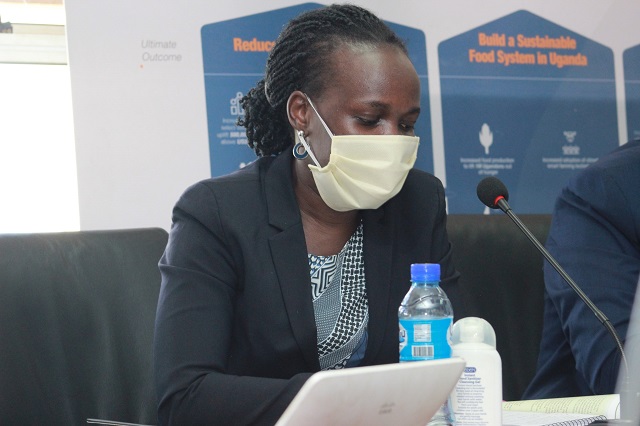
Kampala, Uganda | THE INDEPENDENT | The second wave of the COVID-19 pandemic in Uganda has led to record infections and an increasing number of deaths compared to the previous one, which calls for adjustments in the approach to containing it.
The government’s response with new restrictions on movement and gatherings for 42 days, on top of the first 12 days starting June 6, clearly pause a socioeconomic challenge for the country.
In the first wave, the government announced a total financing to the Uganda Development Bank worth UGX 1,045 billion as part of the strategy to ensure that the economy recovers from the COVID-19 pandemic.
This would be channeled to the private sector through low-interest financing to manufacturing, agribusiness, and other private sector firms to support the production of essential goods and goods for import substitution and export promotion.
The targeted products included food and beverages, textile clothing, hides and skins, paper printing, packaging and publishing, timber and wood works, construction material, pharmaceutical, medical equipment, electrical products and agricultural equipment.
Under the program, beneficiaries were to get a loan minimum of UGX 100 million, an interest rate of 12% per annum for a repayment period of up to 15 years plus a 3-year grace period. To-date, most SMEs who were the main target of the program say they have failed to access the money.
“The terms and conditions for the money were not conducive. A loan of UGX 100 million requires a collateral bigger than that amount. So how many SMEs can afford that?” asked the Executive director at the Federation of Small and Medium Enterprises-Uganda.
Other conditions cited by the entrepreneurs include the documentation of the business operations of up to five years.
UDB says the conditions given are aimed at ensuring that the money goes to investments that will ably manage it and make a return on it. They are also aimed at encouraging small and medium entrepreneurs to formalize their businesses for better operations, but also to ease government planning.
However, there were also reports that some of the money was being given to sectors that were not targeted by the ministry of finance, like real estate. The Bank’s Managing Director Patricia Ojangole refutes those claims.
UDB in partnership with European Union (EU) allocated funds in form of a grant attached to a loan to enable the tourism sector go through the pandemic.
The facility seeks to stimulate businesses operating in the tourism sector which were heavily impacted, by providing a grant and soft loan with flexible terms aligned to the current needs of the sector.
A total approximate pool of UGX 61.8 Billion comprised of UGX 40 Billion UDB loan plus UGX 21.8 Billion EU grant was set aside for this intervention. The bank is yet to give an account of the performance of this program.
However, sections of the tourism sector players cried foul, accusing the UDB of being selective when they learnt that beneficiaries would have to be members of Uganda Hotel Owners Association (UHOA) and Association of Uganda Tour Operators (AUTO). This left out tour guides and travel operators among others who actually account for the majority. As the new wave threatens to devastate the economy and livelihoods, UDB says the problem is the uncertainty it comes with because it is unclear when these measures will take full effect.
“Uganda Development Bank urges its customers, clients, partners, and the public to choose to vaccinate and follow the standard operating procedures put in place by the Ministry of Health”, says a statement by the bank’s management.
Last week, Central Bank officials expressed worry that Uganda had borrowed too much and spent above its ability, which would make it hard for the government to effectively respond to a large scale emergency.
Governor Emmanuel Tumusiime Mutebile sounded a warning that even relief packages this time round might not be possible.
Last time, the BoU agreed with the financial institutions to adjust their service terms including extending loan repayment periods. But he said this time, the relief measures that are coming to the end, might not be possible to repeat because commercial banks are reeling from the effects.
For now, UDB plans to continue with the existing programs, relying on the capitalization funds government committed for the year 2020/21 and expecting more to come next year. The impact of containment measures for the new wave will likely slow down the fragile recovery of the economy.
“The Bank will continue to invest for impact to achieve poverty reduction, build a sustainable food system, support industrialization, and pursue Uganda’s import-substitution program with improved capital investment from the government, and guided by its strategic plan”.
At the onset of the pandemic, the government committed to capitalize UDB to a tune of Ugx 1 trillion to facilitate production, processing, and manufacturing of essential items.
As of June 2021, the bank said it approved credit of Ugx 706 Billion in various projects aligned to the overall recovery strategy, and expected the revived businesses to restore the number of jobs lost and increase revenues to government.
“UDB expects the projects in their full life cycle will create over 104,839 jobs and generate tax worth Ugx 11,921 Billion with the associated socio-economic impact from the firms financed,” says Ojangole.
According to the background to the budget 2021/2022, during the first phase of the pandemic, the economy lost an estimated 100,193 formal jobs with the impact on the informal sector significantly higher. UDB figures show that as af June 2021, disbursements worth Ushs 366 Billion had been made, with manufacturing taking 106.1 billion (29.01%) and agro-industrialization, Ushs 79.5 billion (21.72%). Primary Agriculture projects took 100 billion (27.53%).
By 2022, the bank targets to lift over 200,000 Ugandans out of poverty, by implementing several interventions. These include sustainable agriculture projects like construction of 25 valley dams and 25 small holders and one large holder irrigation schemes.
The Bank also intends to prioritize increasing reducing post-harvest losses, supporting skilling for youth and women enterprises plus assistance to SMEs for the acquisition of modern energy or resource efficient technologies.
*****
URN
 The Independent Uganda: You get the Truth we Pay the Price
The Independent Uganda: You get the Truth we Pay the Price



Like most government agencies failed to live up to the task during and after first wave of covid 19. The in supplied face masks, the food items that went bad in stores, the u supplied radio sets to mention but a few.
UDB likewise is oblivious of the sectors to support or are adamantly and segregatively hand picking businesses to support.
I have four acres in Mubende I wanted just USh 10,000,000 ($3,000) to grow Hass avocado. I approached them and nothing is forthcoming.
What can be done to improve the state of affairs? It is evident that more SMMEs are going to breakdown under the weight of second wave covid 19 lockdown with accompanying job losses and irregular cash flows.